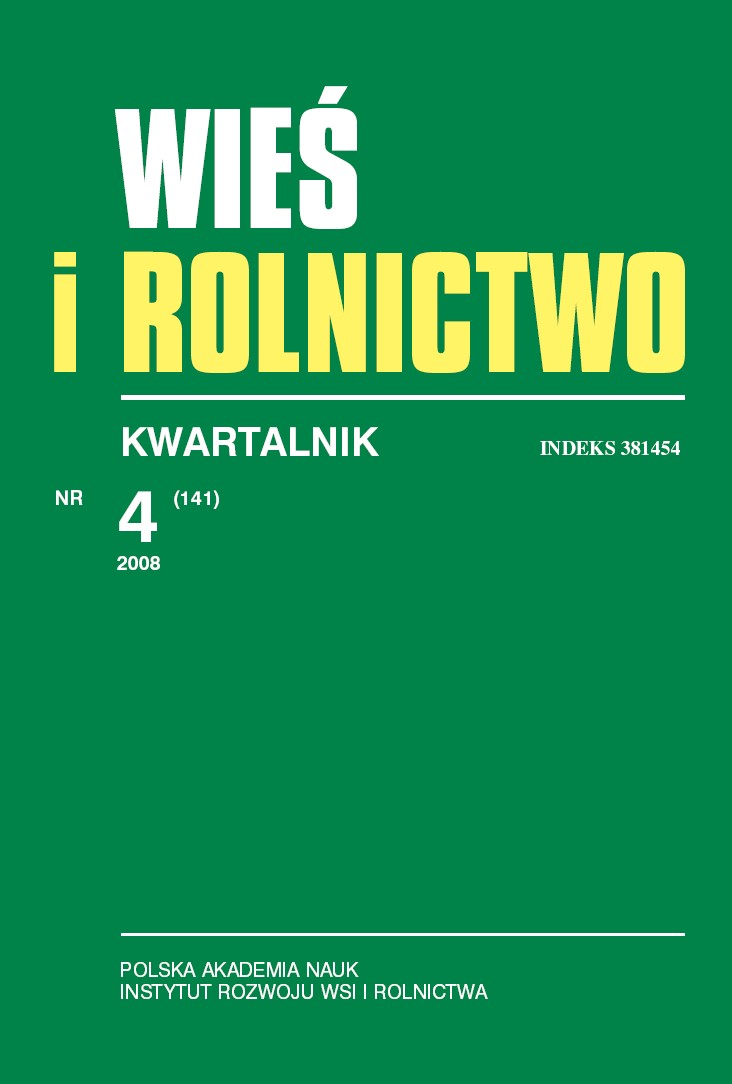Conclusions from Research into Farmers' Protests in Poland
DOI:
https://doi.org/10.53098/wir.2008.4.141/01Keywords:
social protests, farmers, social movements, protest campaign, series of protests, modernisationAbstract
The author of this article tries to define a proper theoretical context for the creation of an analytical model serving to describe and explain the phenomenon of farmers’ protests and he simultaneously presents selected characteristics of such protests staged in 1989–1993 and in 1997–2001. The main conclusions formulated on the basis of the used material suggest that: (1) farmers’ protests were evoked by the worsening economic situation of this social group and the related sense of deprivation, (2) farmers’ protests were characterised by a different dynamics than the protests of other social groups, (3) the main participants of farmers’ protest were owners of large farms undergoing modernisation, (4) farmers’ protests were subject to the processes of institutionalisation as evidenced by the diminishing number of spontaneously stage actions, intensifying co-operation between farmers’ associations during the organisation of protest actions, growing number of serially staged protests and protest campaigns, and a well prepared repertoire of various forms of protest (road blockades, sit-ins organised in government buildings, mass demonstrations), (5) the scope of the protesting farmers’ demands and efforts to address them to the state’s central institutions revealed a tendency towards the presentation of demands of economic nature, towards politicisation and radicalisation of protests in the discussed period.References
Blumer H., 1967: Collective Behavior. In: Principles of Sociology. Ed. A. McClung Lee. Barnes and Noble, New York.
Ekiert G., Kubik J., 1996: Protest Event Analysis in the Study of Democratic Consolidation: Poland, 1989–1993. Maszynopis w posiadaniu autora.
Ekiert G., Kubik J., 1999: Rebellious Civil Society. Popular Protest and Democratic Consolidation in Poland, 1989–1993. University of Michigan Press, Ann Arbor. DOI: https://doi.org/10.3998/mpub.16117
Foryś G., 2008: Dynamika sporu. Protesty rolników w III Rzeczpospolitej. Wydawnictwo Naukowe Scholar, Warszawa.
Freeman J., 1979: Resource Mobilization and Strategy: A Model for Analyzing Social Movement Organization Actions. In: The Dynamics of Social Movements. Eds. M.N. Zald, J.D. McCarthy. Winthrop, Cambridge.
Gliński P., 1996: Polscy Zieloni. Ruch społeczny w okresie przemian. Instytut Filozofii i Socjologii PAN, Warszawa.
Gorlach K., 2001: Świat na progu domu. Uniwersytet Jagielloński, Kraków.
Koopmans R., Rucht D., 1999: Introduction to Special Issue: Protest Event Analysis – Where to Now? „Mobilization” 4, 2. DOI: https://doi.org/10.17813/maiq.4.2.d7593370607l6756
Landsberger H.A., 1974: Rural Protest: Peasant Movements and Social Change. Macmillan, London – Edinburgh. DOI: https://doi.org/10.1007/978-1-349-01612-9
Le Bon G., 1986: Psychologia tłumu. PWN, Warszawa.
McAdam D., Tarrow S., Tilly Ch., 2001: Dynamics of Contentions. Cambridge University Press, New York. DOI: https://doi.org/10.1017/CBO9780511805431
Migdal J., 1974: Peasants, Politics and Revolution. Toward Political and Social Change in the Third World. Princeton University Press, Princeton.
Moore B., 1966: The Social Origins of Dictatorships and Democracy: Lord and Peasant in the Making of the Modern World. Beacon Press, Boston.
Olson M., 1965: The Logic of Collective Action. Harvard University Press, Cambridge. DOI: https://doi.org/10.4159/9780674041660
Paige J., 1975: Agrarian Revolution. Free Press, New York.
Park R.E., 1972: The Crowd and the Public and Other Essays. The University of Chicago Press, Chicago.
Rose J.D., 1982: Outbreaks. The Sociology of Collective Behavior. The Free Press, New York.
Skocpol T., 1989: What Makes Peasants Revolutionary? In: Power and Protests in the Coutryside: Rural Unrest in Asia, Europe and Latin America. Eds. R.P. Weller, E. Guggenheim. Duke University Press, Durham.
Smelser N.J., 1962: Theory of Collective Behavior. The Free Press, New York. DOI: https://doi.org/10.1037/14412-000
Stinchcombe A.L., 1961: Agricultural Enterprise and Rural Class Relations. „American Journal of Sociology” 67, 2. DOI: https://doi.org/10.1086/223082
Tarde G., 1904: Opinia i tłum. Gebethner i Ska., Warszawa.
Tarrow S., 1994: Power in Movement. Social Movements, Collective Action and Politics. Cambridge University Press, New York – Cambridge.
Tarrow S., 1998: Power in Movement. Social Movements and Contentious Politics. Cambridge University Press, New York – Cambridge. DOI: https://doi.org/10.1017/CBO9780511813245
Tilly Ch., 1978: From Mobilization to Revolution. Random House, New York.
Wolf E.R., 1973: Peasant Wars of the Twentieth Century. Harper and Row, New York.
Downloads
Article file downloads
Pages
How to Cite
Issue
Section
License
Copyright (c) 2008 Wieś i Rolnictwo

This work is licensed under a Creative Commons Attribution 4.0 International License.










